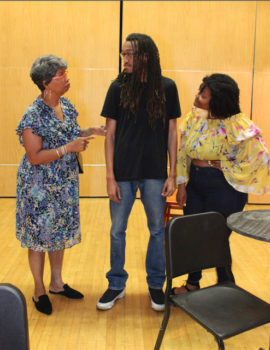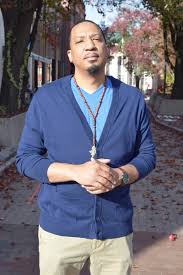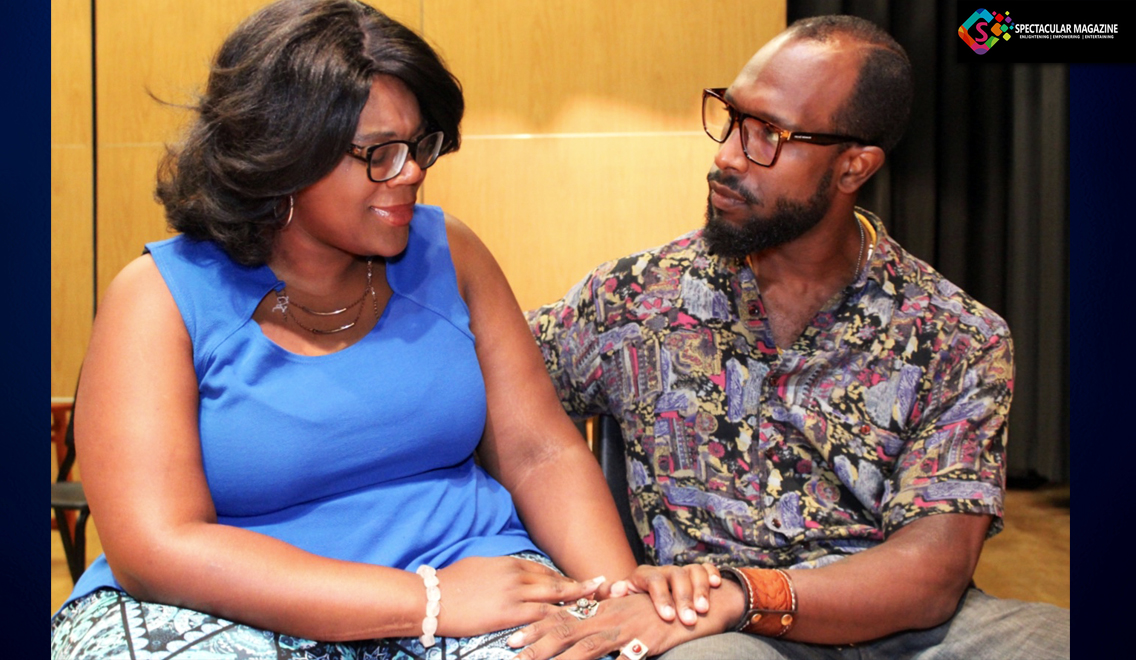A Look Into The Ethnodrama “Write Now, We Will Heal”
Durham, NC – Early last week Spectacular Magazine sat down with Stephanie “Asabi” Howard, Ph.D., the Director of Dasan Ahanu’s ethnodrama “Write Now, We Will Heal” to get some inside information on what to expect and how much work and preparation went into bringing this production to stage. This play takes a look at cervical cancer and how it affects minority communities. The action centers around J’Condria, a young woman writer struggling with the news that her mother may have cervical cancer and her discussions with close friends.


Dasan, an award-winning poet, playwright and UNC-Chapel Hill Visiting Professor, presents the scientific and educational subject matter in an artistic manner that incorporates the audience and encourages them to think. The director, Dr. Asabi, is the Chair of North Carolina Central University’s Department of Theatre and Dance department as well as an associate professor on campus. She states that they have been working on auditions and rehearsals for the last few months but that Dasan, the writer, actually did a lot of scientific research regarding cervical cancer in the minority setting prior to that.
It can be difficult to take a subject that is based in science and transcribe it into art that can be both understood and portrayed accurately; Dasan worked hard and obtained resources, looked into focus groups, completed research and interviews to gain information on the topic then transcribed that data into a work of art for the masses.
The cast consists of a mix of the Durham community, NCCU theatre students and NCCU theatre alumni.
Here Dr. Asabi provides answers to the burning questions we all have about the Ethnodrama Experience: “We Write Now We Will Heal”:
SM (Spectacular Magazine): What is an ethnodrama?

AH (Dr. Asabi Howard): An ethnodrama is “the study of people dealing with a particular experience.” This includes multiple aspects relating back to the specific culture and the particular experience including but not limited to external factors affecting the group of people and characteristics of the culture in general. An ethnodrama should encourage the audience to put themselves into the specific situation being portrayed in the play.
In answering this question, Dr. Asabi, confirms that there is a lot of background information and research needed in order to write an ethnodrama and that the writer, Dasan, spent roughly a year meeting with medical personnel and researching on the medical/scientific end. According to the Center for Disease Control, black women develop cervical cancer at rates of 8.4 percent per 100,000 individuals and Hispanic women at the rate of 9.1% per year. Rates for white women are slightly lower, at 7%.
SM: What are the major takeaways from this production without giving out any spoilers?
AH: A major goal with this production is to educate the population on cervical cancer. The underlying drama goal is to have the audience “step into the shoes of the life experience of the particular family in dealing with the possibility of cervical cancer and how it affects the family unit.” Aristotle states that theatre is meant to be a cathartic experience; meaning that as an audience we empathize with the characters on stage but also understand and think about the possibility of the issue being discussed affecting us.
SM: Was there any data that shocked or surprised you during this experience?
AH: I was shocked to find out that many African American women weren’t aware of the connection between HPV and cervical cancer. I also learned that many women didn’t realize the importance of Pap smears and its role in detecting cervical cancer.
SM: Why is the information being presented in this production important?
AH: Providing content like this as a play is important because it allows basic yet very important educational information to be delivered in an easily “digestible” and “accessible” manner.
SM: Why was it important to educate and include males on the topic of Cervical Cancer?
AH: The lack of education on cervical cancer in the male population showed in the research focus groups. The whole mission of the production is to educate not just the women but the family as a whole.
Dr. Asabi shared so many wonderful details about the importance of this experience as well as the work and preparation that went into bringing this production to the stage. She discussed how the writer, Dasan, is a poet and the underlying meaning of the title “Write Now, We Will Heal” can be interpreted to mean that writing things out and expressing yourself can be therapeutic and important.
She also mentions that there will be a panel of medical professionals and people who have experience dealing with cervical cancer to further educate the audience as well.
NCCU and the Duke CTSI, presenters of the ethnodrama, formed a partnership in 2017 to implement programs related to workforce development, pilot projects and community engagement.
The production was presented in Durham on June 22, 2019, at B.N. Duke Auditorium, on the NCCU campus, and June 23 at the Carolina Theater, 309 W. Morgan St. Charlotte dates are June 29 and June 30 at the Johnson C. Smith University. The performances are free and open to the public.
For more information, click here.
By Tinasia Ingram, LPN/NCCU Nursing Student pursuing her RN.


